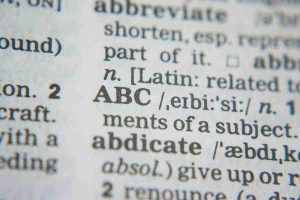Test your English vocabulary size
This test takes only 3 minutes on average
This test consists of two stages. In first stage, we will show you 35 words.
You should choose words that you know well. After choosing words, you should continue for the second stage.
In the second stage, you will see 10 questions.
Here, you should choose the word that has same meaning or if you don’t know the meaning of the word you should choose «I don’t know» option. When you continue,
according to your level, you will see 10 questions more.
Most likely, you will see 20 questions in total in the second stage but it can be 10 to 40 questions depending on your level.
Why should you check your vocabulary?
Language learning consists of the following parts: grammar, vocabulary learning and speaking. Of these; grammar is the one that can be completed in the shortest time. Speaking is only possible if you know words. There are tens of thousands of words in a language. The vocabulary learning process is quite long. You can test your vocabulary to know how many words you know and plan your learning process accordingly.
An example vocabulary size test video
Click here to watch example test
How many words should you know at which level?
| Level | Active Words Range | Passive Words Range |
|---|---|---|
| A1 | 0-300 | 0-600 |
| A2 | 301-750 | 601-1500 |
| B1 | 751-1500 | 1501-3000 |
| B2 | 1501-3000 | 3001-6000 |
| C1 | 3001-5500 | 6001-11000 |
| C2 | 5501-11000 | 11001-20000+ |
Language Proficiency Levels
| BEGINNER | |
| A1 |
Can understand and use familiar everyday expressions and very basic phrases aimed at the satisfaction of needs of a concrete type. Can introduce him/herself and others and can ask and answer questions about personal details such as where he/she lives, people he/she knows and things he/she has. Can interact in a simple way provided the other person talks slowly and clearly and is prepared to help. |
| A2 |
Can understand sentences and frequently used expressions related to areas of most immediate relevance (e.g. very basic personal and family information, shopping, local geography, employment). Can communicate in simple and routine tasks requiring a simple and direct exchange of information on familiar and routine matters. Can describe in simple terms aspects of his/her background, immediate environment and matters in areas of immediate need. |
| INDEPENDENT | |
| B1 |
Can understand the main points of clear standard input on familiar matters regularly encountered in work, school, leisure, etc. Can deal with most situations likely to arise whilst travelling in an area where the language is spoken. Can produce simple connected text on topics which are familiar or of personal interest. Can describe experiences and events, dreams, hopes & ambitions and briefly give reasons and explanations for opinions and plans. |
| B2 |
Can understand the main ideas of complex text on both concrete and abstract topics, including technical discussions in his/her field of specialisation. Can interact with a degree of fluency and spontaneity that makes regular interaction with native speakers quite possible without strain for either party. Can produce clear, detailed text on a wide range of subjects and explain a viewpoint on a topical issue giving the advantages and disadvantages of various options. |
| PROFICIENT | |
| C1 |
Can understand a wide range of demanding, longer texts, and recognise implicit meaning. Can express him/herself fluently and spontaneously without much obvious searching for expressions. Can use language flexibly and effectively for social, academic and professional purposes. Can produce clear, well-structured, detailed text on complex subjects, showing controlled use of organisational patterns, connectors and cohesive devices. |
| C2 |
Can understand with ease virtually everything heard or read. Can summarise information from different spoken and written sources, reconstructing arguments and accounts in a coherent presentation. Can express him/herself spontaneously, very fluently and precisely, differentiating finer shades of meaning even in more complex situations. |
Table: Cefr language levels (CEFR: European Framework of Reference for Languages: Learning, teaching, assessment)
What is vocabulary?
Vocabulary is «words we must know to communicate effectively; words in
speaking (expressive vocabulary) and words in listening (receptive vocabulary)» (Neuman&Dwyer, 2009, p. 385).
Receptive Vocabulary (Passive words)
Receptive vocabulary is words that learners recognize and understand when they are used
in context, but which they cannot produce. It is vocabulary that learners recognize when
they see or meet in reading text but do not use it in speaking and writing (Stuart Webb, 2009).
Productive Vocabulary (Active words)
Productive vocabulary is words that the language learners understand and can pronounce
correctly and use constructively in speaking and writing. It involves what is needed for
receptive vocabulary plus the ability to speak or write at the appropriate time. Therefore,
productive vocabulary can be addressed as an active process, because the learners can
produce the words to express their thoughts to others (Stuart Webb, 2005).
The numbers of active words are less than passives. Because peoeple understand thousands of words on different subjects by listening,
reading and seeing, but they can use only the words in line with their interests and the words used commonly (especially when speaking).
The words people use to understand are passive, and the words that are used to express and build new structures are called active words.
Word Sets
Numbers, days, seasons, months, countries, languages, feelings, adjectives, prepositions, pronouns, modal verbs etc..
Test your vocabulary
Find the words
Fill the missing first and last letters
in the words bellow. A clue is given for each word.
|
1 |
H |
R |
O |
A |
part of the body |
||
|
2 |
A |
T |
U |
R |
a planet |
||
|
3 |
A |
L |
L |
E |
a container for money |
||
|
4 |
A |
B |
B |
I |
an animal |
||
|
5 |
A |
U |
C |
E |
a piece of crockery |
||
|
6 |
P |
I |
D |
E |
an insect |
||
|
7 |
I |
L |
L |
O |
a tree |
||
|
8 |
A |
L |
M |
O |
a fish |
||
|
9 |
A |
N |
I |
S |
to disappear |
||
|
10 |
L |
O |
U |
S |
a piece of clothing |
||
|
11 |
K |
I |
I |
N |
a sport |
||
|
12 |
A |
G |
H |
T |
a number |
||
|
13 |
I |
G |
E |
O |
a bird |
||
|
14 |
A |
W |
Y |
E |
a job |
||
|
15 |
U |
I |
T |
A |
a musical instrument |
||
|
16 |
E |
P |
H |
E |
a relative |
||
|
17 |
I |
Z |
A |
R |
a reptile |
||
|
18 |
A |
D |
I |
S |
a vegetable |
||
|
19 |
E |
T |
R |
O |
Americans call it gasoline |
||
|
20 |
U |
T |
T |
E |
a pipe at the bottom of a roof to carry |
Answer key
Мы используем файлы cookie для обеспечения необходимой работоспособности сайта и персонализации вашего взаимодействия со Skyeng. Продолжая пользоваться этим сайтом, вы соглашаетесь на использование нами файлов cookie, как указано в Соглашении о конфиденциальности
Сколько английских слов вы уже знаете?
Определим ваш словарный запас — без сложных вопросов и с помощью умных алгоритмов. Вы узнаете:
Сколько слов в вашем запасе
Какая следующая цель, чтобы стать лучше в английском
Что делать, чтобы выучить ещё больше слов
созвучны в русском и английском — считайте, что вы их уже знаете
достаточно для уверенного повседневного общения
активный словарный запас носителя языка
Проверьте свой словарный запас
Подайте заявку и узнайте все подробности
Введенный вами номер телефона не соответствуют формату выбранного региона
Напишите мне в вацап
Отправить заявку >>
Нажимая на кнопку, вы принимаете данные условия
- English ESL Worksheets
- General Topics
- Home
Worksheet details
worksheet summary
Here is an illustrated vocabulary test about names of rooms and other things in the house, kitchen , living room foof sofa, bathroom… you can use it asking your students to find the words in a dictionary
General topic
Other pedagogical goals
Level
The above lesson is a great teaching resource for:Beginner (pre-A1), Elementary (A1), Pre-intermediate (A2)
Student type
Special needs students
Elementary schoolers
High schoolers
Solutions
Solutions not included
Quality check
Quality not yet verified by the community.
Sensitivity
This resource does not contain any images, words or ideas that would upset a reasonable person in any culture.
Copyright license
Published 29/05/2015
Sylviepieddaignel is from/lives in France and has been a member of iSLCollective since 2014-11-09. Sylviepieddaignel last logged in on 2023-04-14, and has shared 1089 resources on iSLCollective so far.
Having a strong vocabulary is essential for understanding and communicating effectively in English.
The Barton English Vocabulary Test was designed in 2012 and updated in 2021. A shorter Javascript version of the quiz can now be found here.
This vocabulary test contains hundreds of unique fill-in-the-blank questions to help you build your vocabulary, level by level. In the test, you’ll have to select the most suitable word that matches the sentence in each question. The vocabulary test questions are divided into four English levels.
Here is an example of an upper-intermediate question:
«The outside of the restaurant was recently redesigned in order to … more customers.»
attract propose introduce restore
(The answer is attract).
Please read the level descriptions below to determine which level is best for you. The difficulty of each word has been determined by the English Vocabulary Profile (EVP) and the Corpus of Contemporary American English (COCA).
Feel free to repeat the test again and again so you can learn from your mistakes. Good luck!
Elementary (A2) (15 questions)
- This level is designed to match CEFR A2 level (TOEIC:225, IELTS: 3).
- Sample vocabulary from this level: fast, earn, write.
Intermediate (B1) (31 questions)
- This level is designed to match CEFR B1 level (TOEFL iBT:42, TOEIC:550, IELTS:4.5).
- Sample vocabulary from this level: suggest, doubt, interview.
Upper-Intermediate (B2) (48 questions)
- This level is designed to match CEFR B2 level (TOEFL iBT:72, IELTS:6, FCE).
- Sample vocabulary from this level: threaten, reliable, adjust.
Advanced (C1) (79 questions)
- This level is designed to match CEFR C1 level (TOEFL iBT:95, TOEIC:945, IELTS:7.5, CAE).
- Sample vocabulary from this level: gossip, eligible, optimistic.
Proficient (C2) (125 questions)
- This level is designed to match CEFR C2 level (IELTS:9, CPE).
- Sample vocabulary from this level: instinct, diplomatic, sacred.
Next: How Strong Is Your Vocabulary?
Next: Farm Idioms Quiz
Next: Name That Thing
Next: Name That Hat!
Next: Spell It
Next: Name That Flower
Next: True or False?
Next: Are You Feeling Lucky?
Next: Famous Novels, First Lines Quiz
Test your vocabulary with our 10-question quiz!
What does ‘poke’ refer to in the expression ‘pig in a poke’?
You know what it looks like… but what is it called?
Hear a word and type it out. How many can you get right?
Test your knowledge — and maybe learn something along the way.
The new tax law was a boon to Cindy and Jeff, who just bought a home.
“All children, except one, grow up.”
Тест на словарный запас
Этот онлайн тест создан для того, чтобы любой пользователь мог оценить свой словарный запас совершенно бесплатно и без регистрации. При тестировании вы не только определите сколько английских слов вы знаете, но и приблизительный уровень владения английским языком.
Приступить к тесту
Как работает тестирование
Ни один тест не способен измерить совершенно точно объём вашего словарного запаса, наш тест не исключение, он показывает всего лишь приблизительные данные. Но мы постарались сделать его результаты как можно более приближенным к реальным цифрам и максимально информативными.
У нас есть английский словарь, где содержится около 18000 слов, которые расположены в порядке их частоты употребления в английском языке. Для теста мы сократили этот список слов до 10000 самых популярных слов.
Самый точный способ тестирования подсчитать ваш словарный запас — просмотреть все слова и подсчитать, сколько вы знали. К сожалению, в таком подходе есть очень существенный минус, так как займет довольно много времени.
Мы для себя решили так, что чем чаще встречается какое-то слово в английской речи, тем его проще будет запомнить и тем оно будет легче для запоминания.
| Легкие | Средние | Сложные |
|
1 the 2 of 3 and |
5001 fortress 5002 recipe 5003 bubble |
9998 diver 9999 sickly 10000 princely |
| 1-я группа | 50-я группа | 100-я группа |
После этого мы раздели 10000 слов на 100 групп по сто слов в каждой из них. Далее мы из каждой группы берем по одному слову в случайном порядке и выводим их в тесте. Соответственно всего при тестировании используется сто слов.
В следующем шаге вам необходимо будет отметить те слова, которые вы точно знаете! Не те в которых вы сомневаетесь, а только те в которых вы уверены.
Будьте внимательны мы будем автоматически проверять ваши ответы, и иногда будет всплывать окно с подтверждением, где вы должны будете дать перевод к отмеченному слову. Чем честнее вы будете, тем точнее окажутся результаты теста, и вы реально сможете узнать свой пассивный словарный запас.
Результаты теста
Что бы выдать результаты этого лексического теста, мы берем максимальный балл, который можно было бы набрать в тесте и по результатам ответов высчитываем ваш приблизительный словарный запас и другую информацию по тестированию с другими участниками, прошедшими этот тест ранее.
Ваш примерный словарный запас:
7158 слов
Вы набрали 3451 балов после прохождения теста
Ваш примерный уровень языка:
Уровни знания языка
Таблица по который будет рассчитан ваш примерный уровень английского языка, на основании вашего словарного запаса:
| № | Уровень языка | слова |
| A1 | Beginner, Elementary | 500 — 1000 |
| A2 | Pre-intermediate | 1000 — 3000 |
| B1 | Intermediate | 3000 — 5000 |
| B2 | Upper-Intermediate | 5000 — 8000 |
| C1 | Advanced | 8000 — 10000 |
| C2 | Proficient | 10000 и более |
Другая информация по тесту
Здесь вы сможете посмотреть Ваши достижение после прохождения теста:
Так же будут показаны правильные и неправильные ответы, которые вы дали в тесте ранее. Неправильные ответы или те слова, которые вы не знали ранее вы можете добавить в персональный словарь для дальнейшего изучения. Для того чтобы это сделать вам необходимо нажать на слово и нажать на кнопку добавить в словарь.
Здесь же вы можете посмотреть перевод слов и послушать их произношение на английском языке.
Приступить к тесту
Если у вас есть вопросы или предложения по тесту, оставляйте их в комментариях ниже.
Комментарии к тесту на словарный запас













